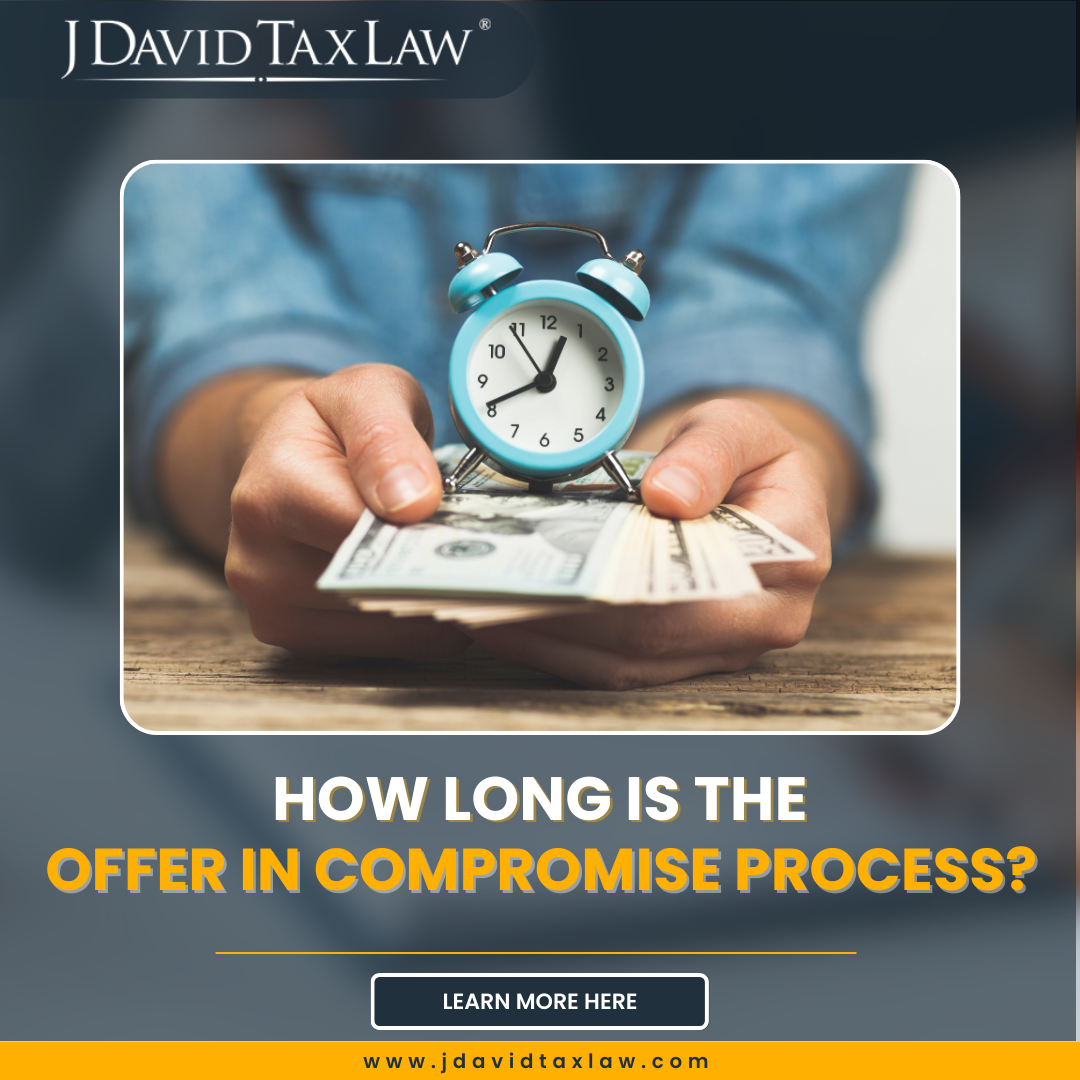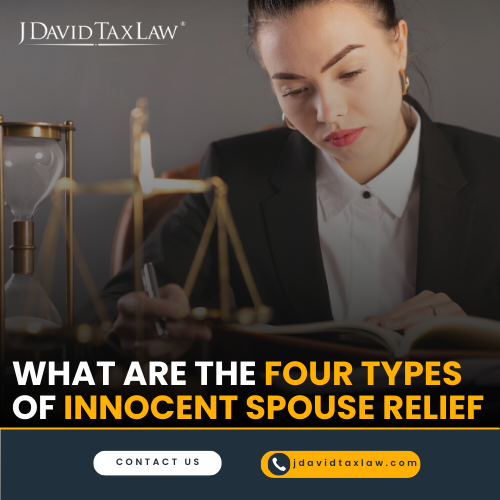
Explore the timeline for the IRS Offer in Compromise, from application to final decision. Call J. David Tax Law at (888) 342-9436 for professional help.





A skilled wage garnishment tax attorney, like one of the tax attorneys at J. David Tax Law LLC, can provide legal advice and representation to protect your rights and interests when facing wage garnishment from the IRS from outstanding tax debt. They can negotiate with creditors, explore possible alternatives to garnishment, and assist in finding a solution that minimizes the impact on your finances. It is important to consult with an experienced tax attorney who specializes in wage garnishment matters to understand your options and ensure your rights are protected.
Wage garnishment is a legal process used by creditors to collect outstanding debts directly from an individual’s earnings. It typically occurs when a court order is issued, requiring the employer to withhold a portion of the employee’s wages and remit it to the creditor until the debt is fully satisfied. This can be an overwhelming situation for anyone facing financial difficulties, as it directly affects their income and ability to meet essential living expenses. Understanding how wage garnishment works is crucial in seeking the right legal advice and taking appropriate measures to protect your rights.
Navigating this complex process requires awareness of important factors such as federal laws, rights, and potential legal implications. Understanding the steps involved will empower individuals facing wage garnishments to take proactive measures towards resolving their debt challenges.
Wage garnishment typically follows a specific process that involves multiple parties – the creditor or judgment holder, the debtor or employee, and the employer. The journey begins with obtaining a judgment against the debtor through proper legal channels. Once a judgment is granted, the creditor can pursue wage garnishment as a means of collecting the outstanding debt.
The first step in the process involves filing necessary paperwork with the court and serving notices to all relevant parties. After receiving notice, the employer is legally obliged to start withholding wages from the employee’s paycheck according to the court-ordered amount. The withheld wages are then sent to the creditor for debt satisfaction.
It is important to note that some debts, such as child support and unpaid taxes, may have different state tax garnishment rules and priority over other types of debt. The priority given to each type of debt can vary depending on federal and state laws.
Wage garnishment also comes with certain legal implications. For employees facing garnishments, it can significantly impact their financial stability, making it challenging to meet basic needs and obligations.
Additionally, it can affect credit scores and future loan prospects. On the other hand, creditors must follow proper legal procedures throughout the wage garnishment process, ensuring compliance with state and federal laws. Failure to adhere to these regulations may result in legal consequences for the creditor.
Now that we have discussed the process and legal implications of wage garnishment, it is crucial to understand your rights as an individual facing this situation and explore ways to navigate federal laws effectively.
When facing wage garnishment, it is essential to understand the federal laws and rights that protect both debtors and creditors. Federal laws provide guidelines on the maximum percentage of an individual’s wages that can be garnished, as well as the types of income that are exempt from garnishment. As a debtor, it is crucial to know your rights and ensure that employers comply with these laws.
One key federal law that governs wage garnishment is the Consumer Credit Protection Act (CCPA). Under the CCPA, there are limits on the amount that can be garnished from a person’s paycheck. In general, creditors can only garnish up to 25% of disposable earnings or the amount by which disposable earnings exceed 30 times the federal minimum wage, whichever is less. It’s important to note that these limits may vary depending on individual circumstances and specific state laws.
Additionally, certain types of income are protected from garnishment under federal law. This includes benefits such as Social Security, Supplemental Security Income (SSI), veterans’ benefits, and certain types of public assistance. While federal law provides some protection for debtors, it’s important to consult with a tax attorney to determine how these laws apply to your specific situation.
By understanding federal laws and rights surrounding wage garnishment, debtors can better navigate negotiations with creditors and ensure that their rights are protected throughout the process.
In wage garnishment cases, it is essential to understand the boundaries that exist between debtors and creditors. Debtors have certain legal protections, and creditors must adhere to specific procedures when attempting to garnish wages.
Debtors have the right to receive notice before wage garnishment begins. Creditors are required to provide a written notice explaining how much money will be garnished from each paycheck and information on how to request a hearing if they believe the amount is incorrect. This notice gives debtors an opportunity to determine if the garnishment is valid and take appropriate action if necessary.
It is important for debtors to keep accurate records of their income, such as pay stubs or bank statements, to compare with the amount stated in the garnishment notice. If there are discrepancies or errors, debtors should contact a tax attorney immediately to address the situation.
Some may argue that creditors have every right to pursue unpaid debts through wage garnishment without any limitations. While it is true that creditors have a legitimate interest in recovering money owed to them, it is equally important to strike a balance between their rights and the rights of debtors. Federal laws provide protection for both parties and ensure fairness in the process.
When facing wage garnishment, hiring a tax attorney can play a crucial role in helping you navigate through the complexities of the legal system and protect your rights. An experienced wage garnishment lawyer will have a deep understanding of the laws surrounding debt collection and will be able to provide expert advice and guidance tailored to your specific situation.
For instance, imagine you received a notice of wage garnishment due to outstanding credit card debt. Without proper legal representation, you might feel overwhelmed and uncertain about your options. However, by consulting with a tax attorney who specializes in wage garnishment cases, you’ll gain access to their vast knowledge and experience in dealing with similar situations. They can analyze the details of your case, assess the validity of the debt, and formulate a strategic plan to challenge or negotiate the garnishment.
Dealing with wage garnishments often involves complex legal procedures and intricacies that are best handled by professionals well-versed in financial law.

When it comes to wage garnishments, adherence to financial laws is paramount. A tax attorney specializing in this area understands not only federal regulations but also state-specific laws regarding garnishments, exemptions, and limitations imposed on creditors. They can navigate these laws on your behalf, ensuring that your rights are protected throughout the process.
Furthermore, a tax attorney can help you evaluate whether proper procedures were followed during the wage garnishment process. They can review the documentation associated with the court order for accuracy and identify any potential errors or violations. If any irregularities are found, they can take immediate action to rectify the situation and halt the garnishment if possible.
By having a tax attorney representing your interests, you have a legal professional who understands the intricacies of wage garnishment cases, and who will work diligently to protect your rights and secure the best possible outcome.
Now that we understand the role of a tax attorney in wage garnishment cases and how they ensure adherence to financial law, it is crucial to choose the right legal representation. Let’s explore what factors to consider when selecting a tax attorney for your wage garnishment case.
When facing a wage garnishment situation, finding the right legal representation is crucial. But how do you choose the right tax attorney to represent you in such a critical matter? Here are some key factors to consider:
First and foremost, experience is paramount. Look for a tax attorney who specializes in tax law or specifically deals with wage garnishment cases like J. David Tax Law LLC. Their expertise and knowledge in this area can make a significant difference in the outcome of your case.
Furthermore, reputation matters. Seek out tax attorneys with a proven track record of success in handling wage garnishment cases. Reading reviews and testimonials from previous clients can provide valuable insights into their level of competence and professionalism.
Additionally, consider the tax attorney’s approach and communication style. It is vital to find someone who listens to your concerns, addresses your questions, and keeps you informed throughout the process. A clear and open line of communication ensures that you are on the same page and working towards a common goal.
Don’t forget to assess the tax attorney’s availability and accessibility as well. Wage garnishment issues require prompt action, so it’s important to work with someone who is readily available to provide guidance and support when needed.
Remember that finding the right legal representation takes time and research, but investing effort at this stage will pay off in the long run. By selecting an experienced tax attorney with a solid reputation, effective communication skills, accessibility, and compatibility with your needs, you will have a strong advocate by your side throughout the wage garnishment process.
Navigating the legal system can be daunting, especially when facing wage garnishment issues. You may feel overwhelmed and unsure about reaching out to a wage garnishment tax attorney due to concerns about the cost of legal representation. However, it’s important to understand that many reputable law firms, including J. David Tax Law, provide flexible fee structures to make legal help affordable for everyone.
Flexible fee structures are designed to accommodate individuals with different financial situations. They offer alternatives to traditional hourly billing and ensure that individuals seeking legal assistance can access professional representation without an exorbitant financial burden. These fee structures may include options such as:
Whether it’s negotiating a payment plan or settling a tax debt, an attorney with excellent negotiation skills will be able to effectively communicate your position, present compelling arguments, and reach a resolution that serves your best interests.
Choosing J. David Tax Law guarantees that you are well-represented and increases the likelihood of achieving a positive outcome in your tax case.
It’s essential to have open and transparent communication with your chosen tax attorney regarding fees, so there are no surprises down the line. During your initial consultation with J. David Tax Law or any reputable wage garnishment tax attorney, you can discuss the fee structure options available and choose the one that best suits your financial circumstances.
Flexible fee structures not only ensure affordability but also provide peace of mind knowing that you can access professional representation without facing significant financial strain. It’s important to remember that seeking legal assistance promptly is crucial in resolving wage garnishment issues, as acting swiftly can help stop or reduce the impact of wage garnishment on your income.
Our tax relief attorneys specialize in tax problems and tax debt resolutions
Get started with a 100% free consultation

Explore the timeline for the IRS Offer in Compromise, from application to final decision. Call J. David Tax Law at (888) 342-9436 for professional help.

Learn how the IRS calculates interest on tax penalties and how to reduce your debt. Call (888) 342-9436 to determine if you qualify for penalty relief.

Learn about the four types of Innocent Spouse Relief and get expert assistance with filing Form 8857 and IRS tax form 8379.Call us at (888) 342-9436
Get IRS Tax Assistance Within 24 Hours